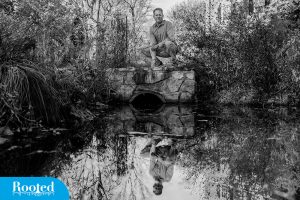Mike Piehler has been contributing to research at Carolina for 25 years.

Mike Piehler has worked for UNC-Chapel Hill for 25 years in a variety of roles, most recently as the director of the Institute for the Environment and the university’s Chief Sustainability Officer. He holds a joint professorship in the Department of Earth, Marine, and Environmental Sciences within the UNC College of Arts and Sciences and in the Department of Environmental Sciences and Engineering within the UNC Gillings School of Global Public Health.
What brought you to Carolina?
I grew up in Pittsburgh but lived in Durham for a year in sixth grade while my dad was on sabbatical at Duke. During that time, my mom started a speech pathology graduate program at Carolina. At that early age in my life, I chose the lighter shade of blue.
Fast-forward to completing a PhD in Environmental Science and Engineering and several years in a research faculty role at UNC-Chapel Hill, I was offered a tenure track faculty position split between the Institute of Marine Sciences (IMS) and the Coastal Studies Institute (CSI), a new multi-institutional research and educational partnership in the Outer Banks. The chance to build a research program at an established lab like IMS and to help build CSI from the ground up was very exciting to me.
How has your role here changed over the years?
My experience has been distinctive in that I began in a relatively small unit at the coast and then moved to Chapel Hill. I was at IMS in Morehead City for 15 years as a faculty member with a research lab focused on sustaining water quality and people’s activities at the coast. In 2018, I moved to Chapel Hill to direct the Institute for the Environment (IE). A couple years after moving to campus, I took on the additional role of chief sustainability officer to lead Sustainable Carolina and coordinate the many distinct sustainability efforts on campus. I serve on the Chancellor’s Cabinet, providing guidance to improve Carolina’s performance in this area. Our Sustainable Carolina team develops and executes ambitious plans to reach short- and long-term sustainability goals while tracking and communicating progress using clear metrics.
What’s kept you at Carolina?
The community, particularly the students. The undergraduate and graduate students who’ve been a part of my lab have been the fuel for our productivity and innovation. As I’ve transitioned to roles with more of an administrative focus, I’ve continued to have the privilege to work with them. Carolina has a fantastic intellectual community, and our students are at the core of it.
What contribution are you most proud of?
I am proud of our research group’s foundational contributions to quantifying the positive impacts oyster reefs can have on water quality. Our work led the research community to focus on this critical piece of coastal resilience. This research was possible because of the amazing students who helped develop the concepts and execute the work, beginning with UNC-Chapel Hill alumna Ashley Smyth, who continues her work on oysters and resilience as a faculty member at the University of Florida.
I am also proud of the direction that IE has taken. The institute’s longstanding areas of strength in air-quality modeling, public engagement, and financial risks in environmental systems are flourishing, and its research capacity has grown to include the energy transition, resilient communities and environments, and unoccupied autonomous vehicles. Bringing Sustainable Carolina into the institute has also been exciting and successful.
What is a uniquely Carolina experience you’ve had?
Hurricane Florence hit the coast in 2018. I had moved to Chapel Hill by then, but my family was still living in our house in Morehead City. My wife and daughter evacuated to Chapel Hill, and the storm ended up being quite damaging.
The day after the storm passed, my phone rang and it was Rick Luettich, the director of the Institute of Marine Sciences, calling to say he drove by to check on our house and that several trees had fallen on it. The next day Rick called again to let me know that he and a group of friends had put temporary patches on our roof. That same day, I got an email from then Dean Kevin Guskiewicz making sure that my family had a place to stay.
You learn about people and organizations during tough times. This experience was the perfect demonstration of how amazingly supportive the Carolina community is.
Rooted recognizes long-standing members of the UNC-Chapel Hill community who have aided in the advancement of research by staying at Carolina. They are crucial to the UNC Research enterprise, experts in their fields, and loyal Tar Heels. Know someone we should feature? Nominate a researcher.